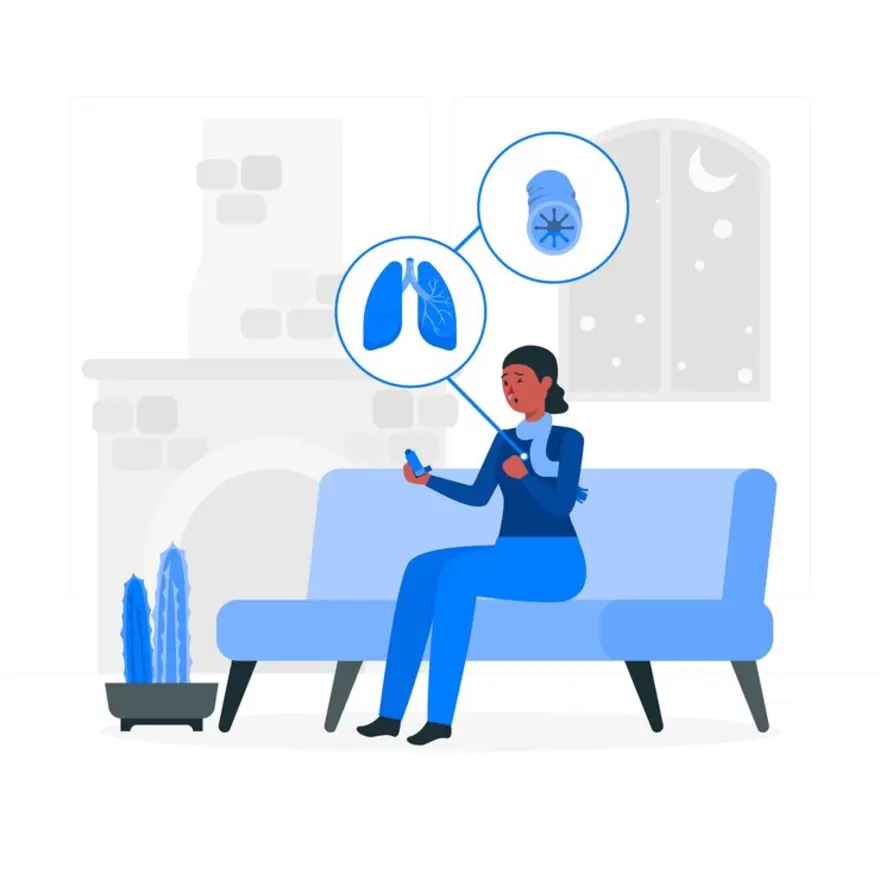NIPT Test (Noninvasive Prenatal Testing)
55+ booked in last 3 daysNon-Invasive Prenatal Screening (NIPT)Test Overview
NIPT is a method used to determine the risk for the foetus being born with certain chromosomal abnormalities, such as Trisomy 21 (Down syndrome), Trisomy 18 (Edwards syndrome) and Trisomy 13 (Patau syndrome). NIPT is the most accurate prenatal genetic screening test currently available.
NIPT is regarded as noninvasive since only the pregnant mother must have her blood drawn and the foetus is not at risk. Small DNA fragments that are floating about in a pregnant woman's blood are examined by NIPT test. These fragments are known as cell-free DNA (cfDNA) because they are free-floating and not contained within cells, in contrast to most DNA, which is found inside the nucleus of a cell. When cells break down and die, their contents, including DNA, are released into the bloodstream as minute fragments with an average size of fewer than 200 DNA base pairs.
The mother's bloodstream during pregnancy contains a mixture of cfDNA from her cells and cells from the placenta. The tissue in the uterus known as the placenta connects the mother's blood supply with the developing foetus. Throughout the pregnancy, these cells are released into the mother's blood. Typically, the DNA of the placenta and the foetus are similar. Without endangering the foetus, cfDNA analysis from the placenta offers a chance for early diagnosis of some genetic disorders.
The NIPT test, or noninvasive prenatal screening, is a safe blood test for the expectant mothers to assess the risk of certain genetic conditions in the foetus. By analysing foetal DNA in the mother’s bloodstream, the NIPT test can detect chromosomal abnormalities like Down syndrome. The NIPT test offers early, reliable insights without the risks of invasive procedures.
Reasons for Undergoing the NIPT Test
There are several compelling reasons why expectant parents might choose to undergo the noninvasive prenatal test or NIPT test. These include:
-
Screening for chromosomal disorders: The NIPT test is a highly effective method for identifying common chromosomal abnormalities like Down syndrome (trisomy 21), Edwards syndrome (trisomy 18), Patau syndrome (trisomy 13), and irregularities in the sex chromosomes.
-
Risk assessment based on Age and medical history: Women who are at a higher risk because of mature maternal age or a personal or family history of any genetic conditions may go for noninvasive prenatal testing for added peace of mind.
-
Alternative to first trimester combined screening: For those who missed the opportunity for first trimester combined screening or if it was not available, the NIPT test serves as a reliable alternative.
-
Preparation for diagnostic testing: The results of the NIPT test can help parents make informed decisions about whether to proceed with more invasive diagnostic procedures like amniocentesis or chorionic villus sampling (CVS).
-
Sex Determination: While not the primary purpose, the NIPT test can also reveal the sex of the foetus for those who wish to know.
List of Parameters Considered During the NIPT Test
The NIPT test analyses cell-free DNA (cfDNA) fragments which are present in the mother's bloodstream to evaluate the risk of chromosomal abnormalities. The key parameters measured and their indications are:
-
Chromosome 21, 18, and 13 cfDNA Fragments: Elevated levels of cfDNA from these chromosomes suggest an increased likelihood of Down syndrome, Edwards syndrome, and Patau syndrome, respectively.
-
Sex Chromosome cfDNA Fragments: Analysis of X and Y chromosome cfDNA can predict the fetus's sex and identify abnormalities like Turner syndrome, Klinefelter syndrome, and Triple X syndrome.
Home Collection for NIPT Test Near You
Choosing a home sample collection for your NIPT test provides numerous advantages, especially when you choose a trusted provider like Metropolis Healthcare. Their trained phlebotomists will visit your home to collect your blood sample, prioritising your comfort and safety. Metropolis Healthcare adheres to the highest standards for sample handling, ensuring the accuracy of your NIPT test results. You can expect to get your promptly and reliably, reflecting their commitment to making quality diagnostic solutions easy to access at home.
NIPT Test (Noninvasive Prenatal Testing) Price
Metropolis Healthcare is a leading diagnostics centre and pathology lab in India equipped with the latest state-of-the-art technologies that provides the NIPT Test (Noninvasive Prenatal Testing) with a clear pricing structure. The NIPT Test (Noninvasive Prenatal Testing) Price in Mumbai is ₹ 16,000. We are committed to deliver accurate and quality results from the best labs in India with complete transparency regarding test cost and turnaround time. No matter where you are, we strive to offer patients high-quality service that is affordable and accessible.
Frequently Asked Questions
- The test is intended for use in pregnant women between 10-17 weeks of pregnancy and who are at high risk for the chromosomal aneuploidies.
- NIPT is recommended for pregnant women to screen for chromosomal diseases that are brought on by an extra or missing copy of a chromosome (aneuploidy).
- NIPT is used to determine the risk for the foetus being born with certain genetic abnormalities such as:
- Down syndrome (trisomy 21, caused by an extra chromosome 21)
- Edwards syndrome (trisomy 18, caused by an extra chromosome 18)
- Patau syndrome (trisomy 13, caused by an extra chromosome 13)
- Extra or missing copies of the X chromosome and Y chromosome, the sex chromosomes)
- Aneuploidies (missing (deleted) or copied (duplicated) sections of a chromosome)
- NIPT is recommended for all types of pregnancies.
- NIPT is offered to all women after at least 10 weeks of pregnancy.
- NIPT is recommended as the first line of screening for all pregnancies, irrespective of the risk.
- NIPT is especially significant if the woman is above 30 years of age.
Patient Preparation: 12-14 hrs fasting required. NIPT is recommended at gestational age between 10 and 17 weeks. Sample collection is required to be done in special tube (streck tube) & by prior appointment. The patient is required to fill test requisition form (TRF) which include Clinician Stamp, Ultrasound Report (USG), Dual and Quadruple Marker Report, and Photo Identification Proof.
NIPT test measures foetal cell-free DNA (cfDNA) in the mother’s bloodstream to be able to identify foetal chromosomal or genetic abnormalities.
NIPT test requires a blood sample. A tourniquet (elastic) band is placed tightly on the upper arm. The patient is then asked to make a fist. This helps in the build-up of blood filling the veins. The skin is disinfected before needle insertion and the blood sample is collected in vacutainer.
NIPT test is performed on ION Genestudio S5 Plus NGS platform and involves isolation of cell free fetal DNA from maternal blood, generation of genomic DNA library, high throughput sequencing of extracted cell free fetal DNA and calculation of molecular mass of fetal DNA in chromosomes. Chromosomal aneuploidies can then be detected using bioinformatics analyses (Sage 12plex analytic program version v.1) where the detection rate and sensitivity are over 99%.
A "low risk" result indicates that there is often very little probability that the baby will have trisomy 21, trisomy 18, or trisomy 13. A trisomy 21, trisomy 18, or trisomy 13 result that is marked as "high risk" indicates that the infant is likely to have one of these chromosomal errors. If your NIPT result is "high risk," you should consulkt a genetic counsellor who can explain your results, offer assistance, go over your options, and set up additional testing as necessary.
To be able to detect foetal chromosome abnormalities, there must be sufficient foetal cfDNA in the mother's bloodstream. The foetal fraction is the percentage of cfDNA in maternal blood that originates from the placenta. The foetal percentage must normally be greater than 4%, which happens during the ninth week of pregnancy. Low foetal fractions may prevent the test from being run or result in a false negative. Low foetal fractions can be caused by foetal abnormalities, sampling mistakes, maternal obesity, and testing too early in the pregnancy.
- D0039 Maternal Screen-1st Trimester Dual Marker Test
- D0041 Maternal Screen-2nd Trimester Triple Marker Test
- D0040 Maternal Screen-2nd Trimester Quadruple Marker Test
The NIPT test is a safe, non-invasive prenatal screening that analyses foetal DNA in the mother’s blood to assess the risk of chromosomal abnormalities. This screening method provides valuable insights without any risk to the foetus, making the NIPT test a reliable option for early prenatal assessment.
The NIPT test is crucial because it offers a safe and accurate way to screen for significant chromosomal abnormalities early in pregnancy, enabling parents to make informed decisions about further testing and prepare for potential health issues in the baby.
The NIPT test can be performed as early as 10 weeks into pregnancy, providing ample time for early risk assessment. At this stage, sufficient foetal DNA is circulating in the mother's bloodstream, allowing for accurate analysis. The NIPT test offers a non-invasive way to screen for chromosomal abnormalities without any risk to the foetus.
A positive NIPT test result indicates a higher risk of a chromosomal abnormality but does not confirm a diagnosis. Additional diagnostic procedures, like amniocentesis or chorionic villus sampling (CVS), may be recommended for confirmation.
The NIPT test offers several advantages, including early screening for chromosomal abnormalities (as early as 10 weeks), a non-invasive approach that poses no risk to the foetus, high accuracy in identifying Down syndrome and other trisomies, and support for informed decision-making regarding further testing and pregnancy management.
No, fasting is not necessary before taking the NIPT test. The test involves a simple blood draw, and there are no specific dietary restrictions or preparations required.
Yes, Metropolis Healthcare provides the option of home sample collection for the NIPT test, making it easier for pregnant women to access this essential screening tool.
The results of the NIPT test are usually available within 10 days, depending on the day/time the sample collected and processed.
Ratings & Reviews (0)
Why Metropolis?
Metropolis has a team of 200 senior pathologists and over 2000 technicians delivering diagnostic solutions in the areas of routine, semi specialty and super specialty domains like Oncology, Neurology, Gynaecology, Nephrology and many more.
We offer a comprehensive range of 4000+ clinical laboratory tests and profiles, which are used for prediction, early detection, diagnostic screening, confirmation and/or monitoring of the disease.



.png)

















 WhatsApp
WhatsApp